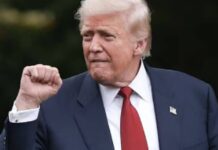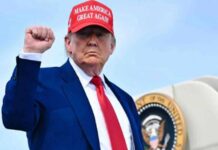
America must defend herself when needed. And Trump knows this better than anyone.
Because he announced military strikes with multiple confirmed casualties.
Trump’s Decisive Action Against Drug Trafficking
President Donald Trump’s announcement of a second U.S. military strike within two weeks targeting alleged Venezuelan drug traffickers just goes to show his administration’s aggressive stance against international drug cartels.
The strike, which killed three “male terrorists” in international waters, was aimed at a vessel carrying “big bags of cocaine and fentanyl,” as Trump stated, emphasizing the operation’s role in disrupting narcotics headed for the United States. The president shared dramatic footage on Truth Social, showing a small boat exploding after a U.S. missile strike, reinforcing his message:
“BE WARNED — IF YOU ARE TRANSPORTING DRUGS THAT CAN KILL AMERICANS, WE ARE HUNTING YOU!”
Trump’s approach, backed by General Dan Caine’s evidence of the boat’s illicit cargo, reflects a strategic shift toward using military force to combat cartels designated as Foreign Terrorist Organizations, such as Venezuela’s Tren de Aragua. This escalation is justified by the cartels’ role in flooding the U.S. with deadly drugs, which Trump claims killed 300,000 Americans last year, though CDC data reports 78,000 drug overdose deaths in the 12 months ending March 2025, a decline from 104,000 the prior year. Trump’s skepticism of official figures aligns with his view that the crisis demands urgent, forceful action to protect national security.
Why Trump’s Strategy Addresses a Critical Threat
Trump’s rationale for targeting international drug traffickers, particularly from Venezuela, is rooted in the severe impact of the drug crisis on American lives and the failure of traditional interdiction methods. The influx of fentanyl and cocaine, often transiting through Venezuela, has fueled a public health emergency, with cartels exploiting weak regional governance to operate with impunity.
Trump’s administration has designated groups like Tren de Aragua and the Cartel de los Soles, allegedly led by Venezuelan President Nicolás Maduro, as terrorist organizations, justifying military strikes as a necessary response to their threat to U.S. national security and foreign policy interests.
The deployment of eight warships, a submarine, and F-35 fighter jets to the Caribbean signals a robust commitment to deterrence, which has already reduced maritime drug trafficking, as Trump noted: “There are no ships in the ocean anymore … meaning no drugs are coming across”.
Former Sinaloa cartel member Margarito “Jay” Flores Jr. affirmed that Trump’s aggressive tactics are instilling fear among traffickers, suggesting the strategy’s effectiveness in disrupting cartel operations. By targeting vessels in international waters, Trump avoids direct territorial violations while sending a clear message to cartels and their alleged state sponsors, like Maduro, who faces a $50 million U.S. bounty for drug trafficking charges.
Escalating Tensions and Strategic Implications
The Trump administration’s military buildup in the Caribbean, including the recent strike, has heightened tensions with Venezuela, where Maduro’s government denies the allegations of drug trafficking and claims the U.S. is fabricating narratives to justify aggression.
Venezuelan officials, including Interior Minister Diosdado Cabello, have called the strikes “murder,” asserting that the targeted individuals were not traffickers, though the U.S. insists it has evidence, including recorded proof, of their culpability.
Trump’s threat to extend similar operations against Mexican cartels smuggling drugs by land indicates a broader campaign to dismantle trafficking networks across the region. Legal concerns have been raised, with experts questioning whether the strikes comply with international maritime and human rights law, particularly since the U.S. is not a signatory to the UN Convention on the Law of the Sea.
However, Trump’s supporters, like Secretary of State Marco Rubio, argue that drug traffickers pose an “immediate threat” to the U.S., justifying lethal force under self-defense principles.
The administration’s actions, including the deployment of advanced military assets and warnings to cartels, aim to choke off the drug supply chain, aligning with Trump’s pledge to prioritize American safety and curb the overdose crisis.



















